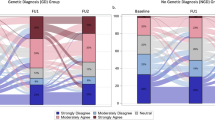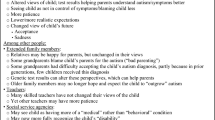Abstract
Knowledge about the etiology of Autism Spectrum Disorders (ASDs) is increasing, but causes remain elusive for most cases. Genetic counselors are positioned to help families that have children with ASDs despite uncertainty regarding etiology. To determine how genetic counselors might best provide services, an anonymous survey was conducted with 255 parents whose children were diagnosed on the autism spectrum. Questions concerned: 1) their perceptions of ASD cause(s) and 2) recurrence risk, 3) whether perceived risk affected family planning decisions, 4) whether parents had received genetic services, and 5) how genetic counselors might assist families. The most prevalent perceived cause was genetic influences (72.6%). Most parents’ recurrence risk perceptions were inaccurately high and significantly affected family planning. Only 10% had seen a genetic professional related to an ASD. Parents provided several suggestions for genetic counselor best practices. Findings indicate the importance of genetic counselor awareness of parent perceptions in order to best help families who have children with ASDs.
Similar content being viewed by others
References
American Psychiatric Association (2000). Diagnostic and statistical manual of mental disorders (Revised 4th ed.). Washington, DC.
AUSM (2007). Autism Info. Autism Society of Minnesota. Website. Retrieved on 6/28/2007 from http://ausm.org/autismInfo/index.asp.
The Autism Genome Project Consortium (2007). Mapping autism risk loci using genetic linkage and chromosomal rearrangements. Nature Genetics, 39, 319–328.
Bacchelli, E., & Maestrini, E. (2006). Autism spectrum disorders: Molecular genetic advances. American Journal of Medical Genetics (Seminars in Medical Genetics), 142C, 13–23.
Bailey, D. B., Skinner, D., & Sparkman, K. L. (2003). Discovering fragile X syndrome: family experiences and perceptions. Pediatrics, 111, 407–416.
Barbaresi, W. J., Katusic, S. K., & Voigt, R. G. (2006). Autism: A review of the state of the science for pediatric primary health care clinicians. Archives of Pediatrics and Adolescent Medicine, 160, 1167–1175.
Centers for Disease Control and Prevention. (2007). Prevalence of autism spectrum disorders- Autism and Developmental Disabilities Monitoring Network, 14 sites, United States. Surveillance Summaries, 2002. Morbidity and Mortality Weekly Report, 56(No. SS-1).
Corsello, C. M. (2005). Early intervention in autism. Infants & Young Children, 18, 74–85.
Decruyenaere, M., Evers-Kiebooms, G., Boogaerts, A., Philippe, K., Demyttenaere, K., Dom, R., et al. (2007). The complexity of reproductive decision-making in asymptomatic carriers of the Huntington mutation. European Journal of Human Genetics, 15, 453–462.
Djurdjinovic, L. (1998). Psychosocial counseling. In D.L. Baker, J.L. Schuette, & W.R. Uhlmann (eds.) A guide to genetic counseling (pp. 127-170). New York: John Wiley & Sons, Inc.
Dosreis, S., Weiner, C. L., Johnson, L., & Newschaffer, C. J. (2006). Autism spectrum disorder screening and management practices among general pediatric providers. Developmental and Behavioral Pediatrics, 27(2), S88–S94.
Downing, C. (2005). Negotiating responsibility: Case studies of reproductive decision- making and prenatal genetic testing in families facing Huntington Disease. Journal of Genetic Counseling, 14, 219–234.
Elder, J. H. (2001). A follow-up study of beliefs held by parents of children with pervasive developmental delay. Journal of Child and Adolescent Psychiatry Nursing, 14(2), 55–60.
Evers-Kiebooms, G., Denayer, L., & Van den Berghe, H. (1990). A child with cystic fibrosis: II. Subsequent family planning decisions, reproduction and use of prenatal diagnosis. Clinical Genetics, 37, 207-215.
Folstein, S. E., & Rosen-Sheidley, B. (2001). Genetics of autism: complex aetiology for a heterogeneous disorder. Nature Reviews Genetics, 2, 943–955.
Fombonne, E. (2003). Epidemiological surveys of autism and other Pervasive Developmental Disorders: An update. Journal of Autism and Developmental Disorders, 33, 365–382.
Fombonne, E., Zakarian, R., Bennett, A., Meng, L., & McLean-Heywood, D. (2006). Pervasive Developmental Disorders in Montreal, Quebec, Canada: Prevalence and links with immunizations. Pediatrics, 118(1), e139–e150.
Freitag, C. M. (2007). The genetics of autistic disorders and its clinical relevance: a review of the literature. Molecular Psychiatry, 12, 2–22.
Geschwind, D. H., & Spence, S. J. (2008). Genetics of autism. Continuum Lifelong Learning Neurology, 14(2), 49–64.
Giarelli, E., & Tulman, L. (2003). Methodological issues in the use of published cartoon data. Qualitative Health Research, 13, 945–956.
Gray, D. E. (1995). Lay conceptions of autism: Parents’ explanatory models. Medical Anthropology, 16, 99–118.
Gupta, A. R., & State, M. W. (2007). Recent advances in the genetics of autism. Biological Psychiatry, 61, 429–437.
Harrington, J. W., Patrick, P. A., Edwards, K. S., & Brand, D. A. (2006a). Parental beliefs about autism. Autism, 10, 452–462.
Harrington, J. W., Rosen, L., Garnecho, A., & Patrick, P. A. (2006b). Parental perceptions and use of complementary and alternative medicine practices for children with autistic spectrum disorders in private practice. Developmental and Behavioral Pediatrics, 27(2), S156–S161.
Henneman, L., Bramsen, I., Vanos, T. A. M., Heyerman, H. G. M., van der Laag, J., van der Ploeg, H. M., et al. (2001). Attitudes towards reproductive issues and carrier testing among adult patients and parents of children with cystic fibrosis (CF). Prenatal Diagnosis, 21, 1–9.
Herman, G. E., Henninger, N., Ratliff-Schaub, K., Pastore, M., Fitzgerald, S., & McBride, K. L. (2007). Genetic testing in autism: How much is enough? Genetics in Medicine, 9(5), 268–274.
Hertz-Picciotto, I., Croen, L. A., Hansen, R., Jones, C. R., van de Water, J., & Pessah, I. N. (2006). The CHARGE Study: An epidemiologic investigation of genetic and environmental factors contributing to autism. Environmental Health Perspectives, 114, 1119–1125.
Honda, H., Shimizu, Y., & Rutter, M. (2005). No effect of MMR withdrawal on the incidence of autism: A total populations study. Journal of Child Psychology and Psychiatry, 46, 572–579.
Jepson, B., & Johnson, J. (2007). Changing the Course of Autism: A Scientific Approach for Parents and Physicians. Boulder: Sentient Publications.
Jones, M. B., & Szatmari, P. (1988). Stoppage rules and genetic studies of autism. Journal of Autism and Developmental Disorders, 18(1), 31–40.
Klauck, S. M. (2006). Genetics of autism spectrum disorder. European Journal of Human Genetics, 14, 714–720.
Klitzman, R., Thorne, D., Williamson, J., Chung, W., & Marder, K. (2007). Decision- making about reproductive choices among individuals at-risk for Huntington’s Disease. Journal of Genetic Counseling, 16, 347–362.
Kolevzon, A., Gross, R., & Reichenberg, A. (2007). Prenatal and perinatal risk factors for autism. Archives of Pediatrics and Adolescent Medicine, 161, 326–333.
Larsson, H. J., Eaton, W. W., Madsen, K. M., Vestergaard, M., Olesen, A. V., Agerbo, E., et al. (2005). Risk factors for autism: Perinatal factors, parental psychiatric history, and socioeconomic status. American Journal of Epidemiology, 161, 916–925.
Lingam, R., Simmons, A., Andrews, N., Miller, E., Stowe, J., & Taylor, B. (2003). Prevalence of autism and parentally reported triggers in a north east London population. Archives of Disease in Childhood, 88, 666–670.
McCarthy Veach, P., LeRoy, B. S., & Bartels, D. M. (2007). Coming full circle: A Reciprocal-Engagement Model of genetic counseling practice. Journal of Genetic Counseling, 16, 713–728.
McCarthy Veach, P., LeRoy, B. S., & Bartels, D. M. (2003). Facilitating the genetic counseling process: A practice manual. New York: Springer/Verlag Publications.
McMahon, W. M., Baty, B. J., & Botkin, J. (2006). Genetic counseling and ethical issues for autism. American Journal of Medical Genetics, 142C, 52–57.
Mercer, L., Creighton, S., Holden, J. J. A., & Lewis, M. E. S. (2006). Parental perspectives on the causes of an autism spectrum disorder in their children. Journal of Genetic Counseling, 15, 41–50.
Mischler, E. H., Wilford, B. S., Fost, N., Laxova, A., Reiser, C., Sauer, C. M., et al. (1998). Cystic fibrosis newborn screening: Impact on reproductive behavior and implications for genetic counseling. Pediatrics, 101(1), 44–52.
National Research Council (2001). Educating children with autism. Committee on Educational Interventions for Children with Autism. Catherine Lord & James P. McGee, eds. Division of Behavioral and Social Sciences and Education. Washington, DC: National Academy Press.
Newschaffer, C. J., Croen, L. A., Daniels, J., Giarelli, E., Grether, J. K., Levy, S. E., et al. (2007). The epidemiology of autism spectrum disorders. Annual Review of Public Health, 28, 235–258.
Patton, M. Q. (1990). Qualitative research methods (2nd ed.). Newbury Park, CA: Sage.
Peay, H. L., McCarthy Veach, P., Palmer, C. G. S., Rosen-Sheidley, B., Gettig, E., & Austin, J. C. (2008). Psychiatric disorders in clinical genetics I: addressing family histories of psychiatric illness. Journal of Genetic Counseling, 17, 6–17.
Rapin, I. (1997). Autism. New England Journal of Medicine, 337(2), 97–104.
Ritvo, E. R., Spence, M. A., Freeman, B. J., Brothers, A. M., Mo, A., & Marazita, M. L. (1985). Evidence for autosomal recessive inheritance in 46 families with multiple incidences of autism. American Journal of Psychiatry, 5, 51–57.
Rosen, B., Wolpert, S., Donnelly, M., Pericak-Vance, V. A., & Folstein, S. (2000). Surveying parents of children with autism: what is their understanding of the genetic basis for this disorder? Journal of Genetic Counseling, 9, 547.
Rutter, M. (2006). Autism: its recognitions, early diagnosis, and service implications. Developmental and Behavioral Pediatrics, 27(2), S54–S58.
Schaefer, G. B., & Mendelsohn, N. J. (2008). Genetics evaluation for the etiologic diagnosis of autism spectrum disorders. Genetics in Medicine, 10, 4–12.
Simonoff, E. (1998). Genetic counseling in autism and pervasive developmental disorders. Journal of Autism and Developmental Disorders, 28, 447–456.
Sivell, S., Elwyn, G., Gaff, C. L., Clarke, A. J., Iredale, R., Shaw, C., et al. (2008). How risk is perceived, constructed and interpreted by clients in clinical genetics, and the effects on decision making: Systematic review. Journal of Genetic Counseling, 17, 30–63.
Smith, A.C.M. (1998). Patient education. In D.L. Baker, J.L. Schuette, & W.R. Uhlmann (eds.) A guide to genetic counseling (pp. 99-121). New York: John Wiley & Sons, Inc.
Whitelaw, C., Flett, P., & Amor, D. J. (2007). Recurrence risk in autism spectrum disorder: a study of parental knowledge. Journal of Paediatrics and Child Health, 43, 752–754.
Woo, E. J., Ball, R., Bostrom, A., Shadomy, S. V., Ball, L. K., Evans, G., et al. (2004). Vaccine risk perception among reporters of autism after vaccination: Vaccine Adverse Event Reporting System 1990–2001. American Journal of Public Health, 94, 990–995.
Acknowledgments
This study was completed in partial fulfillment of the requirements for the first author’s Master of Science degree from the University of Minnesota. We would like to thank the Autism Society of Minnesota for distributing this survey invitation to their list-serve, without which we would not have received such a large response. We are deeply grateful to the respondents for taking the time to provide such thoughtful comments.
Author information
Authors and Affiliations
Corresponding author
Additional information
Dr. Allyn McConkie-Rosell served as Advisory Editor for this manuscript.
Rights and permissions
About this article
Cite this article
Selkirk, C.G., McCarthy Veach, P., Lian, F. et al. Parents’ Perceptions of Autism Spectrum Disorder Etiology and Recurrence Risk and Effects of their Perceptions on Family Planning: Recommendations for Genetic Counselors. J Genet Counsel 18, 507–519 (2009). https://doi.org/10.1007/s10897-009-9233-0
Received:
Accepted:
Published:
Issue Date:
DOI: https://doi.org/10.1007/s10897-009-9233-0




